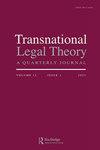人类世的生态规律
Q2 Social Sciences
引用次数: 10
摘要
本文的动机是生态法律思想需要在多大程度上改变和适应人类世。我的论点是,法律学者倾向于使用“人类世”的概念作为人类对环境产生极端影响的同义词。然而,很少有人更进一步地考虑生态法的知识基础或规范性建议是否受到了地球系统科学的挑战。这正是我在这篇文章中想要解决的问题。第一部分介绍了地球系统科学的主要发现。在此之后,第二部分提出了生态律师面临的两个挑战。首先,我认为我们应该放弃制定非人类中心主义法律理论的尝试,接受人类中心主义的描述性和感性形式。其次,我认为地球系统科学破坏了世界各地立法中的许多版本的生态完整性。本文章由计算机程序翻译,如有差异,请以英文原文为准。
Ecological law in the Anthropocene
ABSTRACT The issue motivating this article is the extent to which ecological legal thinking needs to change and adapt to the Anthropocene. My contention is that legal scholars tend to use the notion of the ‘Anthropocene’ as a synonym for the extreme impact human beings are having on the environment. Yet, few go further and consider whether the intellectual foundations or prescriptive proposals of ecological law have been challenged by Earth systems science. This is precisely the gap I intended to address in this article. Part one provides a descriptive summary of key findings in Earth systems science. Following this, part two presents two challenges to ecological lawyers. First I argue that we ought to abandon attempts to formulate a non-anthropocentric theory of law and embrace descriptive and perceptual forms of anthropocentrism. Second, I argue that earth systems science undermines many versions of ecological integrity found in legislation around the world.
求助全文
通过发布文献求助,成功后即可免费获取论文全文。
去求助
来源期刊

Transnational Legal Theory
Social Sciences-Law
CiteScore
2.10
自引率
0.00%
发文量
7
期刊介绍:
The objective of Transnational Legal Theory is to publish high-quality theoretical scholarship that addresses transnational dimensions of law and legal dimensions of transnational fields and activity. Central to Transnational Legal Theory''s mandate is publication of work that explores whether and how transnational contexts, forces and ideations affect debates within existing traditions or schools of legal thought. Similarly, the journal aspires to encourage scholars debating general theories about law to consider the relevance of transnational contexts and dimensions for their work. With respect to particular jurisprudence, the journal welcomes not only submissions that involve theoretical explorations of fields commonly constructed as transnational in nature (such as commercial law, maritime law, or cyberlaw) but also explorations of transnational aspects of fields less commonly understood in this way (for example, criminal law, family law, company law, tort law, evidence law, and so on). Submissions of work exploring process-oriented approaches to law as transnational (from transjurisdictional litigation to delocalized arbitration to multi-level governance) are also encouraged. Equally central to Transnational Legal Theory''s mandate is theoretical work that explores fresh (or revived) understandings of international law and comparative law ''beyond the state'' (and the interstate). The journal has a special interest in submissions that explore the interfaces, intersections, and mutual embeddedness of public international law, private international law, and comparative law, notably in terms of whether such inter-relationships are reshaping these sub-disciplines in directions that are, in important respects, transnational in nature.
 求助内容:
求助内容: 应助结果提醒方式:
应助结果提醒方式:


